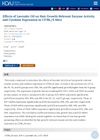 19 citations
,
May 2020 in “Cells”
19 citations
,
May 2020 in “Cells” Substance from human umbilical cord blood cells promotes hair growth.
21 citations
,
January 2020 in “Pharmaceutical Biology” Salvia plebeia extract can stimulate hair growth.
 3 citations
,
November 2019 in “Cosmetics”
3 citations
,
November 2019 in “Cosmetics” Shampoo with Inula Helenium and Caesalpinia Sappan Bark extracts promotes hair growth and prevents hair loss in androgenetic alopecia patients.
 16 citations
,
October 2019 in “Biological & Pharmaceutical Bulletin”
16 citations
,
October 2019 in “Biological & Pharmaceutical Bulletin” Houttuynia cordata extract may help hair grow by improving cell survival and increasing cell growth.
 10 citations
,
April 2019 in “Journal of Analytical Science and Technology”
10 citations
,
April 2019 in “Journal of Analytical Science and Technology” Lactobacillus plantarum hydrolysates may help increase hair growth by boosting VEGF production.
 27 citations
,
August 2018 in “Therapeutic Delivery”
27 citations
,
August 2018 in “Therapeutic Delivery” Nanotechnology could make hair loss treatments more effective and reduce side effects, but more research is needed before it's available.
24 citations
,
June 2018 in “PubMed” Serenoa repens extract helps regrow hair and repair hair loss by activating certain cell growth pathways.
 42 citations
,
February 2018 in “International Journal of Molecular Sciences”
42 citations
,
February 2018 in “International Journal of Molecular Sciences” Minoxidil boosts hair growth by triggering growth factor release from specific stem cells.
20 citations
,
February 2018 in “Cell transplantation” Cinnamomum osmophloeum leaf extract may help treat hair loss by promoting hair growth and increasing hair cell proliferation.
 15 citations
,
November 2017 in “Drug Delivery and Translational Research”
15 citations
,
November 2017 in “Drug Delivery and Translational Research” Certain extracts from Curcuma aeruginosa Roxb. and germacrone can boost the skin's absorption of minoxidil, a hair growth promoter, making it more effective.
 33 citations
,
September 2017 in “Molecules”
33 citations
,
September 2017 in “Molecules” Red ginseng oil and its components help promote hair regrowth and could treat hair loss.
 29 citations
,
August 2017 in “Skin appendage disorders”
29 citations
,
August 2017 in “Skin appendage disorders” IGF-1 may affect hair growth and loss, but more research is needed to confirm effective and safe treatments.
 8 citations
,
May 2017 in “Chinese Journal of Integrative Medicine”
8 citations
,
May 2017 in “Chinese Journal of Integrative Medicine” Miscanthus sinensis flower extract may help promote hair growth and prevent hair loss.
 25 citations
,
March 2017 in “Archives of Dermatological Research”
25 citations
,
March 2017 in “Archives of Dermatological Research” Sinapic acid may help hair growth by activating a specific cell pathway.
 36 citations
,
February 2017 in “BMC Complementary and Alternative Medicine”
36 citations
,
February 2017 in “BMC Complementary and Alternative Medicine” Geranium sibiricum extract helps hair grow and is more effective than minoxidil but can be toxic in high concentrations.
 3 citations
,
December 2016 in “KSBB Journal”
3 citations
,
December 2016 in “KSBB Journal” The herbal medicine promotes hair growth and could be an effective treatment.
 7 citations
,
December 2016 in “Journal of The Taiwan Institute of Chemical Engineers”
7 citations
,
December 2016 in “Journal of The Taiwan Institute of Chemical Engineers” Pig blood plasma can be used to promote human hair growth and is a good alternative to the commonly used serum additive.
 1 citations
,
March 2016 in “Journal of Investigative Cosmetology”
1 citations
,
March 2016 in “Journal of Investigative Cosmetology” Lavender oil promotes hair growth in mice.
 26 citations
,
January 2016 in “Annals of Dermatology”
26 citations
,
January 2016 in “Annals of Dermatology” Ecklonia cava polyphenols help increase human hair growth and reduce hair loss.
 3 citations
,
January 2016 in “Biotechnology and Bioprocess Engineering”
3 citations
,
January 2016 in “Biotechnology and Bioprocess Engineering” Laminaria japonica extract with IGF-1 improved mouse hair growth and could be a potential alopecia treatment.
 12 citations
,
September 2014 in “Journal of Food Science and Nutrition”
12 citations
,
September 2014 in “Journal of Food Science and Nutrition” Platycarya strobilacea extract is a strong antioxidant that can grow hair better than minoxidil.
 25 citations
,
November 2012 in “Phytotherapy Research”
25 citations
,
November 2012 in “Phytotherapy Research” Crataegus pinnatifida extract may help increase hair growth and thickness in mice.
 54 citations
,
September 2012 in “Dermatologic Clinics”
54 citations
,
September 2012 in “Dermatologic Clinics” Some medications can cause hair loss, but stopping the drug usually leads to recovery within 3 months.
8 citations
,
April 2012 in “Korean journal of medicinal crop science/Han-gug yagyong jagmul hag-hoeji” Rosa multiflora root extract promotes hair growth and prevents hair loss.
 69 citations
,
December 2011 in “Journal of Ethnopharmacology”
69 citations
,
December 2011 in “Journal of Ethnopharmacology” Some Thai plants, especially Carthamus tinctorius, could help prevent hair loss and promote hair growth without adverse effects.
 12 citations
,
June 2011 in “Han-guk sikpum gwahakoeji/Han'gug sigpum gwahag hoeji/Han-guk sikpum gwahak hoeji”
12 citations
,
June 2011 in “Han-guk sikpum gwahakoeji/Han'gug sigpum gwahag hoeji/Han-guk sikpum gwahak hoeji” Lactobacillus plantarum-fermented plant extracts promote hair growth and thickness.
 321 citations
,
December 2009 in “Journal of Dermatological Science”
321 citations
,
December 2009 in “Journal of Dermatological Science” Dermal cells are key in controlling hair growth and could potentially be used in hair loss treatments, but more research is needed to improve hair regeneration methods.
 131 citations
,
July 2009 in “Experimental Dermatology”
131 citations
,
July 2009 in “Experimental Dermatology” The document concludes that specific cells are essential for hair growth and more research is needed to understand how to maintain their hair-inducing properties.





























